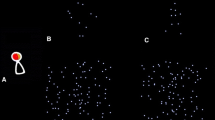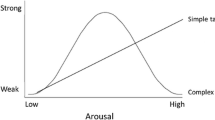Summary
Caged canaries exhibit two general repetitive stereotypies which have been termed route-tracing and spot-picking. Since certain stereotyped behaviors in chimpanzees have been related to level of arousal, and even regarded as mechanisms for regulating the arousal level, an attempt was made to determine the relationship between stereotypies and level of arousal in the canary. The arousal level was manipulated through administration of drugs known to affect arousal mechanisms. These pharmacological agents were administered orally 60 min before testing occurred. An equal volume of water served as the placebo. Stereotypies were counted in 5-min observation periods, excluding time spent singing, feeding, drinking, and preening.
The results suggest that canary stereotypies reflect the level of arousal but do not serve to alter it. Drugs which cause decreases in arousal also produce decreases in the number of stereotypies. The effects of the arousal-raising drugs are variable and seem to depend on whether the drug exerts its effects mainly on increasing motor activity or on increasing responsiveness to external stimuli. The muscle relaxant carisoprodol apparently increases spot-picking by reducing proprioceptive feedback from muscles associated with pecking.
Similar content being viewed by others
References
Berkson, G., and W. A. Mason: Stereotyped behaviors of chimpanzees: relation to general arousal and alternate activities. Perceptual and Motor Skills 19, 635 to 652 (1964).
— —, and S. V. Saxon: Situation and stimulus effects on stereotyped behaviors of chimpanzees. J. comp. physiol. Psychol. 56, 786–792 (1963).
Davis, G. D.: Effects of drugs on locomotor activity of monkeys. Fed. Proc. 15, 44–45 (1956).
Feldman, R. S., and K. F. Green: Effects of chlordiazepoxide on fixated behavior in squirrel monkeys. J. Psycho-Pharmacol. 1, 37–45 (1966).
Fiske, D. W., and S. R. Maddi: A conceptual framework. In: Functions of Varied Experience (Ed. by D. W. Fiske & S. R. Maddi). Homewood, Ill.: Dorsey 1961.
Fitz-Gerald, F. L.: Effects of drugs upon stereotyped behavior in isolation-reared chimpanzees. Paper read at AAAS meeting in Montreal (1964).
Goodman, L. S., and A. Gilman: The Pharmacological Basis of Therapeutics, Vol. 3. New York: The Macmillan Co. 1965.
Hediger, H.: Wild Animals in Captivity. London: Butterworth 1950.
Hess, E. H.: Effects of drugs on imprinting behavior. In: Drugs and Behavior (Ed. by L. Uhr and J. C. Miller). New York: John Wiley & Sons Inc. 1960.
Hollis, J. H.: Chlorpromazine: Direct measurement of differential behavioral effect. Science 159, 1487–1489 (1968).
Keiper, R. R.: Causal factors of canary stereotypies. Anim. Behav. 17, 114–119 (1969).
Kelleher, R. T., W. C. Riddle, and L. Cook: Observing responses in pigeons. J. exp. Anal. Behav. 5, 3–13 (1962).
Nissen, H.: Individuality in the behavior of chimpanzees. Amer. Anthropologist 58, 407–413 (1956).
Sargent, T. D., and R. R. Keiper: Stereotypies in caged canaries. Anim. Behav. 15, 62–66 (1967).
Author information
Authors and Affiliations
Rights and permissions
About this article
Cite this article
Keiper, R.R. Drug effects on canary stereotypies. Psychopharmacologia 16, 16–24 (1969). https://doi.org/10.1007/BF00405252
Received:
Revised:
Issue Date:
DOI: https://doi.org/10.1007/BF00405252




